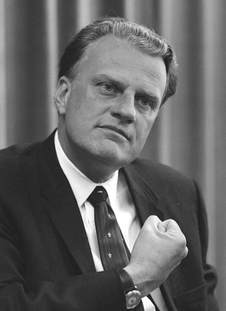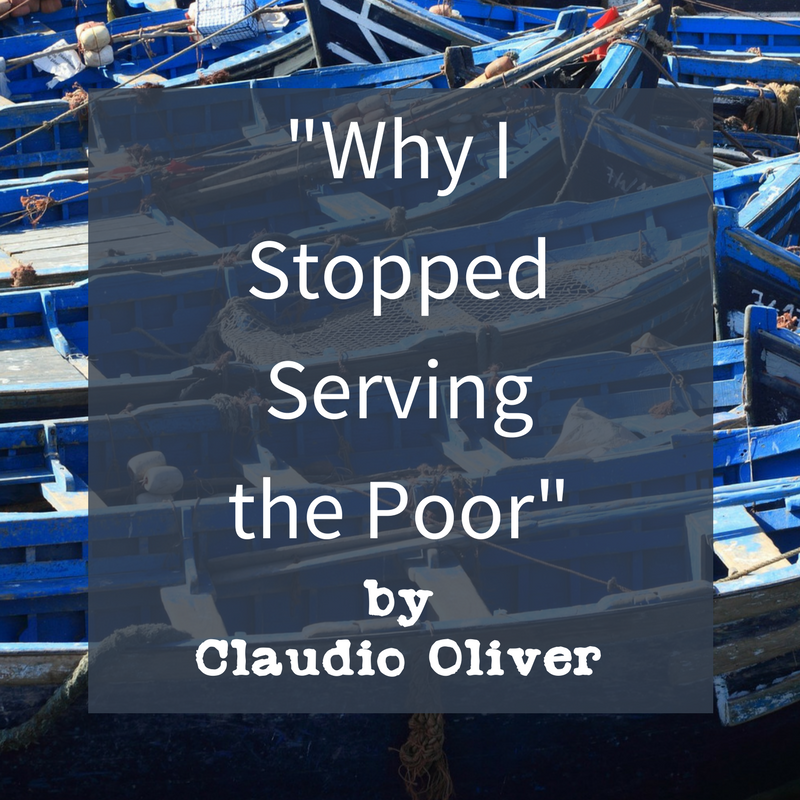 William Franklin Graham Jr.—otherwise known as Billy—was born about twenty miles from where I currently sit. He died about 130 miles away in Montreat, North Carolina. At age 99, he was one of the most influential preachers and evangelists of our time. When people think of white evangelicalism, they often trace it back to Billy Graham. He and I share many things: our home state, our evangelical label, our passion for the Gospel. Even in his death, he is still teaching me new facets of the faith. Still, a part of me struggles with the legacy he leaves behind. To be honest, this is a hard article to write: on the one hand, I sincerely admire Mr. Graham and am so grateful for the ways in which he testified to who Jesus Christ was and is and ever will be. But there is within me a desire to be honest, open, and even vulnerable as I attempt to eulogize without euphemizing, illuminate without idolizing — and I sincerely hope that when I die others will do the same for me. So here I lay out three lessons to learn from Billy Graham’s Legacy, and at the end a final thought on death in the Christian community. Three lessons to learn from Billy Graham’s Legacy 1. Every human being is flawed—even your favorite spiritual leader We know that ‘None is righteous. No, not one.’ As Romans 3, Psalms 14 and 53 tell us. This may be the most challenging and the most critical tool of our time as Christians in today’s theological and political landscape. It’s easy to find flaws and then exclude someone from the faith. We must wrestle against this temptation on both sides. Whether it’s the conservative arguing that there is no room at Christ’s table for the gay couple or the liberal arguing there is no room at Christ’s table for closed-minded Christians, not one of us has a fully robust and perfect Christian theology that allows us a seat at that table. Indeed it is Christ’s blood alone. There are several issues I have with Graham including his narrowed focus on personal salvation rather than communal shalom, his disturbing words about Jewish Americans (that yes, he did apologize publicly for), and his judgmental and conversion-fixated views about homosexuality. But I still have much to learn from the man who for 60 years preached to hundreds of millions of people all over the world. Graham was intentional about seeking out unconventional relationships such as one with Californian gang boss Mickey Cohen, North Korean President (at that time) Kim Il-sung, and Kremlin officials in the Soviet Union — an amazing example of living out Jesus’ words, “Love your enemies.” Graham befriended Martin Luther King Jr. who once said—according to Graham’s website—that Graham’s influence played a role in King’s success with the Civil Rights Movement. Graham is quoted as saying, “Christianity is not a white man’s religion, and don’t let anybody tell you that it’s white or black. Christ belongs to all people; He belongs to the whole world.” John Perkins gives a beautiful testimony of what Graham did for racial reconciliation saying, “Racism is not compatible with the Christian faith, and Billy Graham and I were partners in removing ropes of segregation and replacing them with a foundation of love and brotherhood.” Perkins says that Graham regretted not doing more, and humbly confessed this to him. Graham is noted for not speaking to segregated audiences in the 1950s, and even paid King’s bail once in 1960. Would I have done the same? I certainly hope so, even if it came at losing support of a platform base. Yet critics call him out for not doing more toward pressuring for legislative changes within the Civil Rights Movement. The Guardian went into further detail in this critique: Once leaders like Martin Luther King Jr began practicing civil disobedience and asking for the federal government to guarantee African Americans’ rights, Graham’s support evaporated. Within days of the publication of King’s famous 1963 Letter from a Birmingham Jail, Graham told reporters that the Baptist minister should “put the brakes on a little bit”. He criticized civil rights activists for focusing on changing laws rather than hearts. Today, many white Southern preachers I know respond to the racial tension in America with simplistic narratives of “We don’t have a skin issue we have a sin issue.” I wish I could say that Graham would immediately and ardently cut through that thinking and direct people to the Gospel that has something to say to our racially unreconciled world. While not negating what he did do when it comes to racial reconciliation, the theology he ascribed to prevents one from getting too involved. His words here remind me too much of the skin-sin argument. “If the church wants high, moral standards in the nation and a new social justice, then let the church get back to preaching the simple, authoritative Gospel of Jesus Christ in the power of the Holy Spirit,” he preached on his radio show The Hour of Decision in 1967. In some areas Graham was hyper-aware of the need of the Gospel and his need to live it out, while in others he wasn’t. I think that can be said of all of us. This is why diversity is non-negotiable. We need people in our lives from diverse Christian backgrounds to speak to our theological blind spots. The Global Church is the Bride of Christ, and when we do not include all of her, we have an incomplete picture of who she is. If we want to move forward in Christianity, we must be able to ‘chew on the meat and spit out the bones’. There is no boneless sermon; there is no flawless preacher. 2. Christianity Shouldn’t Be an Oligarchy Circling back to Graham’s words on how Christianity is not the white man’s religion, we must also recognize that whether intentional or not, white evangelicalism rose precisely because of Billy Graham’s influence in America. Most white, southern congregations will ascribe to similar views of the Bible. Many Southern Baptist churches reference the Billy Graham Evangelistic Association (BGEA) for answers to biblical questions. Many southern congregations do not think twice about supporting BGEA’s sister organization (spearheaded by Billy’s son Franklin Graham) Samaritan’s Purse, despite the damaging effects of Operation Christmas Child on developing nations, and the perpetuated white-savior-like images that come from this program. In Charlotte’s white evangelical landscape, there’s almost an unwritten rule that you shouldn’t speak up against the Grahams. This should be a warning for us. If we want to move forward in Christianity, we must confess and lament our own sins, allow others to lovingly call out our sins, and lovingly reciprocate. 3. Billy Graham is the Father of Modern White Evangelicalism While Billy Graham is not the only influence over white evangelicalism, he certainly is one of the largest modern influences we can point to. Certain aspects of his life resonate with what we see in today’s evangelical landscape. If we want to move forward in Christianity, we must see who we are and see who we aren’t. A. We back down from social justice issues when things get hot and platforms are at stake. The Raleigh News & Observer said this: In the 1960s, Graham was criticized for not marching with Martin Luther King Jr. Uncomfortable with some of King’s protests and arrests, Graham shied from bold pronouncements. “Billy Graham was always non-confrontational,” said biographer Martin. “He felt everybody ought to be nice.” Growing up in conservative evangelical Christianity, being nice was often the holy grail. But I remember reading a John Eldridge book that said something to effect of “Mr. Rogers wouldn’t have been crucified.” Nonetheless, being nice is still a subtle commandment of evangelicalism. We must knock down our idol of niceness and make room for a countercultural Jesus who cursed fig trees, broke traditions to heal people, and tethered himself only to God the Father. B. We focus on conversion more than on discipleship. While one can certainly argue that many of those who were converted at one of Graham’s crusades have since become disciples (praise God!), we must also note that discipleship costs a lot more than a raised hand and a bowed head. Modern evangelicalism is often more concerned with width of converts rather than depth of discipleship. We must knock down our idol of number lust and make room for a Jesus who cared about the heart, soul, mind, and strength of every human being he interacted with. C. We are good at celebrity Christianity. The celebrity Christian will end up — intentionally or not — creating clones if he/she is not intentional about diffusing such from happening. The New York Times obituary on Feb. 21 said, “In his younger days, Mr. Graham became a role model for aspiring evangelists, prompting countless young men to copy his cadences, his gestures and even the way he combed his wavy blond hair.” One can argue this isn’t Billy’s fault. I agree; however, we must recognize that it happens and diffuse it when we can. Unfortunately, white evangelicalism has continued in this trend: it has been written that Sovereign Grace Ministries pastors would mimic C.J. Mahaney’s style and preaching cadence (and I can attest to this first-hand). I’d also say that, once again, living in the Charlotte area, I see pastors here and in other states who want to mimic the ministry style and preaching cadence of Steven Furtick. Originality and authenticity may get a Christian leader to a certain position, but those qualities don’t seem to produce an end goal of megaphones and megachurches. We must knock down the idol of celebritism and make room for a Jesus who was nothing like the king the Jews imagined themselves waiting for. Billy Graham leaves a legacy for all of Christianity to wrestle with. One that in so many ways ushered in a new era of American Christianity. One that allowed millions of people to hear the Good News of Jesus Christ. I am forever grateful for that. There is much he left us to build upon, and much he left us to do. May we imitate Christ as we seek to continue building the American Church. One Final Thought: The Grave Requests the Truth It’s interesting that we quote Jesus’ words “the truth will set you free” when it is convenient for us. The truth about each of our human, imperfect lives is not easy to wrestle with. We are sinners and saints. That is also the truth of the Gospel, which I often say is both terrible and terrific. It is terrible when it reveals and confronts the evil within us; terrific for it call us out of that evil and gives us a new identity as child of God. When I was a student of journalism, I remember my wise professor warning us about eulogies. “It’s easy to glorify the dead,” he said. And he challenged us to write balanced eulogies, a task that supplies a demand no one seems to want. In piecing together this article, it is interesting that the news outlets like CNN, New York Times, BBC, and Guardian have no issues pointing to the good and the bad of Graham’s life, but the Christian publications I sought seem to only glorify his life. It begs the question: should we not, even in death, be the best truth tellers?[1] If we cannot speak the truth about the nature of human legacies (that they are all tainted to some degree) of those who have gone before us in the faith, what does it say about those who will come after us? _________________________________________ [1] I get that many reporters were scrambling today to piece together the eulogy of a great man, but nonetheless I do wish I saw more Christian-authored pieces that offered a more balanced perspective of his life.
0 Comments
Leave a Reply. |
Gena's
|

 RSS Feed
RSS Feed

